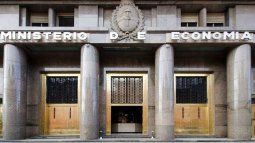The Minister of Economy dismissed the rumors and clarified that it is not linked to the reduction of the PAIS tax.
The Minister of Economy, Luis “Toto” Caputo, dismissed rumors about a possible devaluation within the framework of the reduction of the PAIS tax: “Given the unfounded rumors, we clarify with Santiago Bausili that if the Bases law, “The reduction of the country tax is NOT associated with any devaluation.”
The content you want to access is exclusive to subscribers.
In the midst of a decline in the markets, the head of the economic portfolio announced that will roll back the PAIS tax rate from 17.5% to 7.5% when the Bases law is approved, a decision that would lower the cost of imports but could negatively affect national production and revenue. The rate would be the same as that in force in December 2023 when Javier Milei assumed the presidency.


It is worth remembering that In recent months, this tribute became one of the ones that contributed the most resources to the State coffers. National, along with the traditional VAT, Profits and Social Security Contributions.
Meanwhile, uncertainty over the Bases law generates a drop in ADRs and bonds: in the Buenos Aires stock market, the S&P Merval loses 1.3% to 1,556,605.13after climbing 3.8% in the previous session and improving 24.8% during May.
Embed – https://publish.twitter.com/oembed?url=https://x.com/LuisCaputoAR/status/1800573270003208579&partner=&hide_thread=false
Given the unfounded rumors, we clarify with Santiago Bausili that if the Bases law is approved, the reduction of the country tax is NOT associated with any devaluation.
The current 80/20 or the 2 pct crawling will not be touched either. @Kicker0024— totocaputo (@LuisCaputoAR) June 11, 2024
PAIS tax: which operations would benefit from the lowering of the rate
The details of the operations that must pay the PAIS Tax are as follows:
- Purchase of foreign currency for savingsincluding traveler’s checks.
- Purchase of foreign currency to pay obligations for: acquisition abroad of personal, cultural and recreational services (does not include educational teaching), or its acquisition in the country when provided by non-residents; import of goods, as long as they are not exempt; acquisition abroad or in the country (provided by non-residents) of the services indicated in Annex II of Decree 99/2019, and acquisition abroad or in the country (provided by non-residents) of freight services and other transportation services for import or export operations of goods.
- The purchase operations of banknotes and currencies in foreign currency for the repatriation of non-resident portfolio investments generated from collections in the country of profits and dividends received after September 1, 2019
- Subscription in pesos of bonds or securities issued in dollars Americans by the Central Bank, for those who have debts for imports of non-exempt goods with registration of customs entry or import of services until December 12, 2023, inclusive.
- Subscription in BOPREAL pesos or those bonds or securities that the BCRA issues in the future with the same purpose for the payment of profits or dividends and repatriation of non-resident portfolio investments generated in collections in the country of profits and dividends received as of September 1, 2019
- Foreign currency exchange carried out by financial institutions on behalf of and by order of the acquirer, tenant or borrower.. It will apply to currency exchanges intended for the payment of goods or services abroad that are paid with credit cards, purchase cards, debit cards or any other equivalent means of payment, including withdrawals or cash advances made in the outside. Also included are purchases in foreign currency that are made from portals or virtual sites or any other modality.
- Foreign currency exchange carried out by financial entities on behalf and by order of the contractor residing in the country. It will apply to currency exchanges that are intended to pay for services provided by non-residents in the country that are paid with credit, purchase, debit cards or any other equivalent means of payment.
- Payment for services abroad hired through travel and tourism agencies in the country.
- Payment for passenger transportation services to destinations outside the country. Those who contract, in the country, land transportation services for passengers to neighboring countries must not pay the tax.
Source: Ambito
I am a 24-year-old writer and journalist who has been working in the news industry for the past two years. I write primarily about market news, so if you’re looking for insights into what’s going on in the stock market or economic indicators, you’ve come to the right place. I also dabble in writing articles on lifestyle trends and pop culture news.




